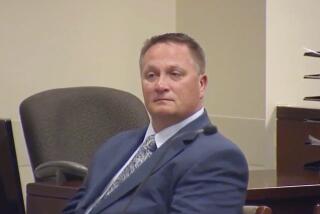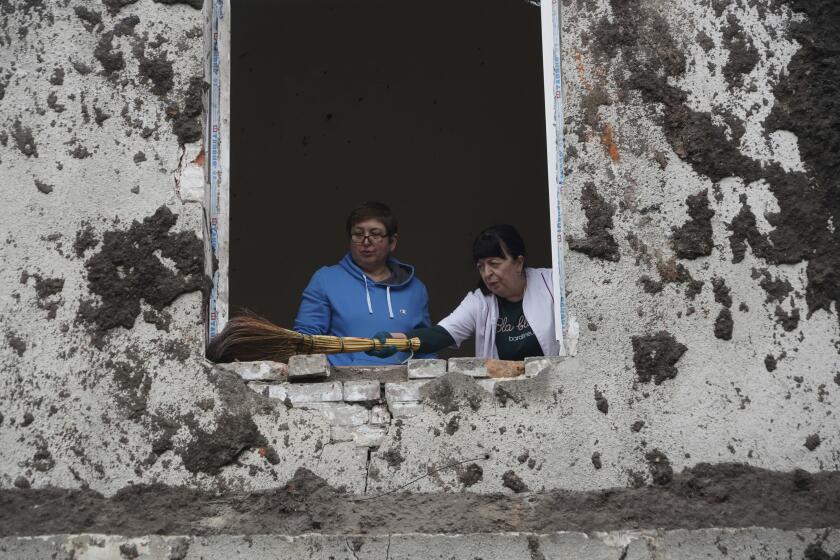Life Without Mubarak? Unimaginable
She wasn’t even born when he came to power, but 22-year-old Ranya Moheidin insists that President Hosni Mubarak should keep his job for six more years.
“He’s done too much for us,” said the Arabic literature student, wearing a Muslim head scarf and elaborate eye makeup as she lingered on the fringes of a Mubarak rally in this dreary industrial town on the banks of the Nile. “We can’t have anybody in his place.”
It’s a common refrain as voters prepare to cast ballots Wednesday in Egypt’s first contested presidential election. The competitive voting is an unprecedented experiment in a country where people have repeatedly gone to the polls to vote “yes” or “no” in referendums with a lone candidate: Mubarak.
Despite the political discontent often voiced in the Egyptian street about harsh poverty and repression under an aging, authoritarian leader, many people are so wary of a change in leadership that they say they’ll vote for the status quo.
At a time when the Bush administration talks about democracy in the Middle East as a pillar of its foreign policy, the Egyptian election offers a haunting view of the region’s autocratic mind-set. The voting might crack open the door for greater freedoms, but analysts say it will also strengthen Mubarak’s hand by easing foreign pressure for reform.
After decades of censorship, social conditioning and reports of fraud in lower-level elections, the idea that voters could oust the iconic man who has ruled them for almost a quarter of a century is beyond the imagination of many analysts, not to mention ordinary Egyptians.
“This has gone into the consciousness of the Egyptian people: that the president of the republic is a demigod, the bringer of good to everybody,” said Mounir Fakhri, a legislator with the opposition Wafd Party. “This is unfortunately what the regime has put into people’s minds, and we want to change it.”
But so far, none of the nine opposition candidates seems to have made much headway in eroding the 77-year-old Mubarak’s aura of invulnerability.
“If you tell the man on the street that you’re running against the president,” Fakhri said wryly, “he gets shocked. ‘What, the president?’ ”
Many Egyptians say that Mubarak is “full,” that he already has all the power and cash he needs and can therefore be trusted not to steal. Many people, it seems, firmly believe that a new president would immediately help himself and his family to anything that wasn’t nailed down.
“If we have only one that can govern, and we chose him,” said Ahmed Ali, a 22-year-old graduate student in the southern town of Minya, “does that mean we’re not democratic?”
Popular political theory holds that reforming Egypt is the key to reforming the Arab world. This crumbling, sprawling country, mired in poverty and clouded with smog, is rooted like a decrepit grand-uncle at the epicenter of Arab consciousness. If Egypt moves, the thinking goes, the rest of the Arab countries will follow.
But people power hasn’t been Egypt’s strong point. This election was handed down from on high one morning in February, when Mubarak announced that Egyptians would finally have a chance to vote for president.
When parliament, dominated by Mubarak’s party, hammered out the election law, independent candidates were in effect outlawed and severe restrictions were slapped on political parties.
In recent months, young, well-heeled professionals working for top Egyptian officials have become more visible. They wear stylish suits, speak smooth English and hint that they are privately uncomfortable with the flaws in the Egyptian system -- but that long-awaited change is just around the bend.
Within six years, they say, political parties will get stronger, and the public will become more familiar with opposition candidates. This election is just a beginning, they say. Wait until the next one.
“It’s difficult to change the legacy of 50 years in a few months,” said Mohammed Kamal, a spokesman with Mubarak’s campaign. “It’s going to take time for the people to believe that this is serious, it’s going to be free and fair and so on. This is a new experience for people in Egypt.”
A young, Johns Hopkins-educated member of Mubarak’s National Democratic Party, Kamal says that the campaign has been “the return of politics to Egyptian life.”
“If you talk with Egyptians, you notice that they’re talking about campaigns, candidates and programs,” he said. “It’s become a daily thing for them.”
That’s the hope of reform-minded Egyptians: that the election has raised expectations, injected civic spirit into society, planted the idea of political change.
“The biggest challenge is trying to convince people that they can make a change, their votes will be taken into consideration,” said Gamila Ismail, wife and press secretary to opposition candidate Ayman Nour, the most prominent and outspoken of the men running against Mubarak. “The people have no confidence. We’re trying to tell them to just try, just for one day, try.”
Even the Muslim Brotherhood, the powerful, outlawed Islamist party that’s widely viewed as the most potent force on the Egyptian street, broke with its habit of boycotting the presidential referendum. As an illegal organization, the party is banned from the race, but Brotherhood leadership urged its members to vote -- for anyone other than Mubarak.
“No doubt it’s a turning point. It will benefit the Egyptian people in the end, though [Mubarak] is set to win,” said Mohammed Mahdi Akef, leader of the Muslim Brotherhood. “That’s what we came to understand in the Muslim Brothers. That’s why we called on the people to play a positive role in what’s happening.”
No matter what happens at the polls, Egypt remains a fundamentally autocratic state. Virtually every line of power winds up in the hands of one man: Mubarak. He holds sway over the military, the ruling party, parliament and the central bank. Analysts and judges say that he has slowly eroded the independence of the judiciary.
Mubarak has brooked very little dissent, ruling Egypt with the sweeping powers of emergency law. Human rights groups say at least 16,000 people, many of them political prisoners, are languishing in Egyptian prisons without trial, charge or hope of release.
“People in Egypt are very scared of the future. They say, ‘I don’t know anybody else, I don’t have an alternative,’ ” said Nasser Amin, director of the Arab Center for the Independence of the Judiciary and the Legal Profession. “But who’s made it so there’s no alternative? They shut down all the leadership, they stopped people from speaking. It’s their right to be scared and say, ‘Let’s stick with this man.’ It’s exactly what the government intended.”
On the sultry summer night when Mubarak opened his campaign, members of Cairo’s wealthier class decked themselves in finery and made their way to the lush lawns of Al Azhar Park. So did the young faithful of the ruling party, clad in matching baseball caps and white T-shirts and toting pictures of the president.
As the setting sun washed the domes and minarets of ancient mosques in rose light, a famous soccer goalie named Ahmed Shobeir bellowed into a microphone. “This will be the first time we go out and vote for ourselves!” he cried into the cheering crowd. “Doesn’t that mean that Mubarak is freedom? Isn’t Mubarak freedom?”
“Mubarak, my love, you’re part of my heart!” the young people yelled back. “Mubarak, you know that your youth will never disobey you!”
As the months before the election slipped past, Egyptian politics seemed to open and close like a night-blooming flower. Scathing anti-Mubarak articles peppered the opposition press, and government-run media pushed right back with campaigns against Mubarak’s challengers. Raucous street demonstrations snapped the taboo of chanting against Mubarak, but the protesters were sometimes beaten down mercilessly by club-wielding conscripts.
In his campaign, Mubarak hinted that he would abolish the emergency law that’s as old as his presidency -- and replace it with anti-terrorism legislation that human rights groups fear would preserve the government’s ability to carry out extrajudicial arrests.
In the run-up to the election, fear of vote fraud has grown. Foreign election monitors have been banned, and Egyptian civil society monitors have still been fighting the election commission for the right to enter polling stations. Hundreds of judges have balked at the restrictions and warned that the rules are a recipe for fraud.
But the campaigns have pressed on. On a blistering afternoon, opposition candidate Nour marched through Minya, flanked by high-stepping horses with ribs showing through and old men blasting their breath into pipes.
The locals stood around the plaza to watch him pass. And when he was gone, they began to argue.
“We hope somebody other than Hosni Mubarak wins,” Abdel Hakim Khalaf said. “All of Minya is very tired, and we’re looking for something.”
Khalaf is 45, but he looked much older. His Coke-bottle glasses made his eyes look big and round in his grizzled face, as if the world came as a constant surprise. He had no job, and didn’t seem to think he had much to lose, for he spoke recklessly. “It’s a complete mess over here,” he said.
A crowd of men had begun to collect. A few of them nodded approvingly, but others muttered threateningly.
Khalaf ignored them. He described the shack he rents for about $16 a month. He said that his wife had studied technology but couldn’t find a job.
“Stop giving Egypt a bad reputation,” yelled one of the men. “We all love Mubarak,” said another.
Khalaf turned to face them.
“What, you can’t tell the truth anymore? Are you undercover?” he said indignantly. “What did you ever get from Hosni Mubarak?”
Another man, who looked to be in his 30s, took advantage of the crowd’s diverted attention. He leaned over and said, quietly and in English, “It’s true. The people is very hungry.”
Down the street, more men crowded before the metal bars of a bread distribution center to collect their subsidized loaves. The bread cost less than a penny for a small, gritty loaf.
“The bread is awful, it’s for animals,” cried one of the men. But the others scoffed and pulled him into the crowd.
“Oh yeah?” one of them sneered. “Do you think Ayman Nour is going to change the bread?”
*
Times staff writer Hossam Hamalawy in Cairo contributed to this report.
More to Read
Start your day right
Sign up for Essential California for news, features and recommendations from the L.A. Times and beyond in your inbox six days a week.
You may occasionally receive promotional content from the Los Angeles Times.






